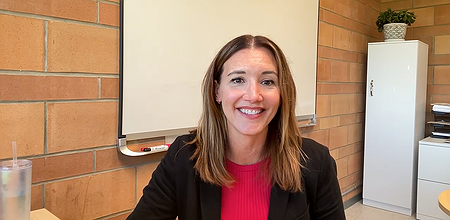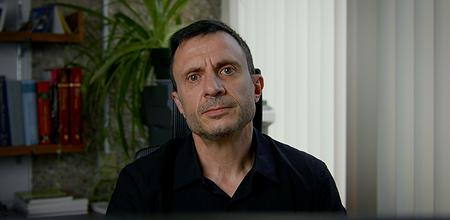A theoretical course illustrated with clinical examples. This course is composed of videos of 5 to 15 minutes each. The PowerPoint of the course to download.
Overcoming Compassion Fatigue as Mental Health Professionals
Dr. Patti Ashley, Psychologist
How to co-regulate with clients using therapeutic empathy in clinical settings
 Introduction to key constructs and practices
Introduction to key constructs and practices
Excerpt:
- 1h30 of continuing education
- 12 lessons that last from 5 to 15 minutes each
- 1 certificate of achievement
- 1 PowerPoint
- 1 bibliography
- 1 course evaluation
- 4 months access - automatically extended until you complete the course
- 7-day money back guarantee
- 80% of participants who completed the satisfaction survey declare they would recommend this course to a colleague
Overview
Today’s mental health crisis has led to a shortage of available therapists to meet increasing needs. Clinicians are managing heavier workloads, excessive demands, and longer hours. The pandemic stressors of COVID 19 affected clinicians as well as clients, as everyone experienced this global crisis. Many are still recovering from the trauma and impact of the pandemic lockdown and stress. Additionally, the increase in social unrest, global warming, war, injustice, gender issues, and much more have led to a heaviness in daily life for many people.
Compassion fatigue is a term used to describe the physical, emotional, and psychological impact of helping others. Clinicians are frequently exposed to traumatic stories which can be experienced as secondary traumatic stress or vicarious trauma in the nervous system. This secondary trauma can affect thoughts, moods, and well-being outside of work. Feeling stressed, overwhelmed, exhausted, burn-out, and unmotivated are all signs of compassion fatigue.
Therapists often witness situations such as threats of suicide, major depression, anxiety, chronic illness, death, grief, bereavement, psychosis, and a multitude of traumatic stories. At times clinicians may even be physically or verbally threatened. All of this coupled with the lingering stress of the pandemic and other global problems is a lot to manage.
Recognizing how trauma and stress impact the nervous system can help clinicians demystify some of the heaviness felt with compassion fatigue. Giving yourself permission to feel the feelings, practice emotional regulation, and create daily self-care routines are some keys to managing secondary trauma in the day -to-day workload.
With this workshop, you will gain a better understanding of the impact of global stressors on the nervous system and learn to recognize how to co-regulate with clients using therapeutic empathy in clinical settings. You will also learn about practices, tools and techniques to manage stress and to implement self-care practices that calm the nervous system.
About the expert

International workshop presenter, author, and psychotherapist, Dr. Patti Ashley, PhD, LPC, has integrated 40 years of experience in special education, child development, and psychology into her wholehearted work as a psychotherapist, author, and international speaker. Dr. Ashley owns and operates Authenticity Architects in Boulder, Colorado, bringing unique insights into the identification and treatment of shame, trauma, grief, and dysfunctional family patterns. She completed a PhD in psychology from the Union Institute and University, a MS in early childhood from Old Dominion University, and a BS in special education from James Madison University. She is the author of Living in the Shadow of the Too-Good Mother Archetype (2014), Letters to Freedom (2019), and Shame-Informed Therapy: Treatment Strategies to Overcome Core Shame and Reconstruct the Authentic Self (2020). For more information, please visit www.pattiashley.com
Learning objectives
- Analyze the impact of global stressors on the nervous system
- Co-regulate with clients using therapeutic empathy in clinical settings
- Practice tools and techniques to manage stress
- Implement self-care practices that calm the nervous system
Learning material
Syllabus
- PowerPoint
-
Understanding the Mental Health Crisis and Therapeutic Foundations
- 1. Introduction
- 2. Today's mental health crisis
- 3. Polyvagal theory and the ANS
- 4. Four therapeutic R s
- 5. Right brain psychotherapy
-
Strategies for Resilience and Compassion in Mental Health Practice
- 6. Strategies of disconnection and defense against shame
- 7. Therapeutic empathy-four skills at once
- 8. Tools to tame stress part 1
- 9. Tools to tame stress part 2
- 10. Healing your heart
- 11. Meditation practice
- 12. Conclusion
- Bibliography
CE Credits
Download a certificate of successful completion.
Audience
This training is intended for mental health professionals.
Registration
Ask a question
Do you have a question? Then email us at contact@asadis.net
Frequently asked questions
-
How long do I have access to the course?
After your registration, the course is accessible anytime and from anywhere for 124 days. And if that’s not enough, we’ll automatically extend your access.
-
When does the course start?
That is entirely up to you! When you buy a course, you'll receive an access link that you can activate when you want.
-
Is there a student rate?
Yes there is! To learn more, email us at contact@asadis.net.
You may also be interested in:
Legal notice
The courses offered by ASADIS are accredited by different professional organisations. In addition, ASADIS is approved by the Canadian Psychological Association to offer continuing education for psychologists. ASADIS maintains responsibility for the program.
The CPA’s approval of an individual, group, or organization as a CE Sponsor or Provider is restricted to the activities described in the approved application or annual report form. The CPA’s approval does not extend to any other CE activity the Sponsor or Provider might offer. In granting its approval, the CPA assumes no legal or financial obligations to Sponsors, Providers, or to those individuals who might participate in a Sponsor or Provider’s CE activities or programs. Further, responsibility for the content, provision, and delivery of any CE activity approved by the CPA remains that of the CE Sponsor or Provider. The CPA disclaims all legal liability associated with the content, provision, and delivery of the approved CE activity.





